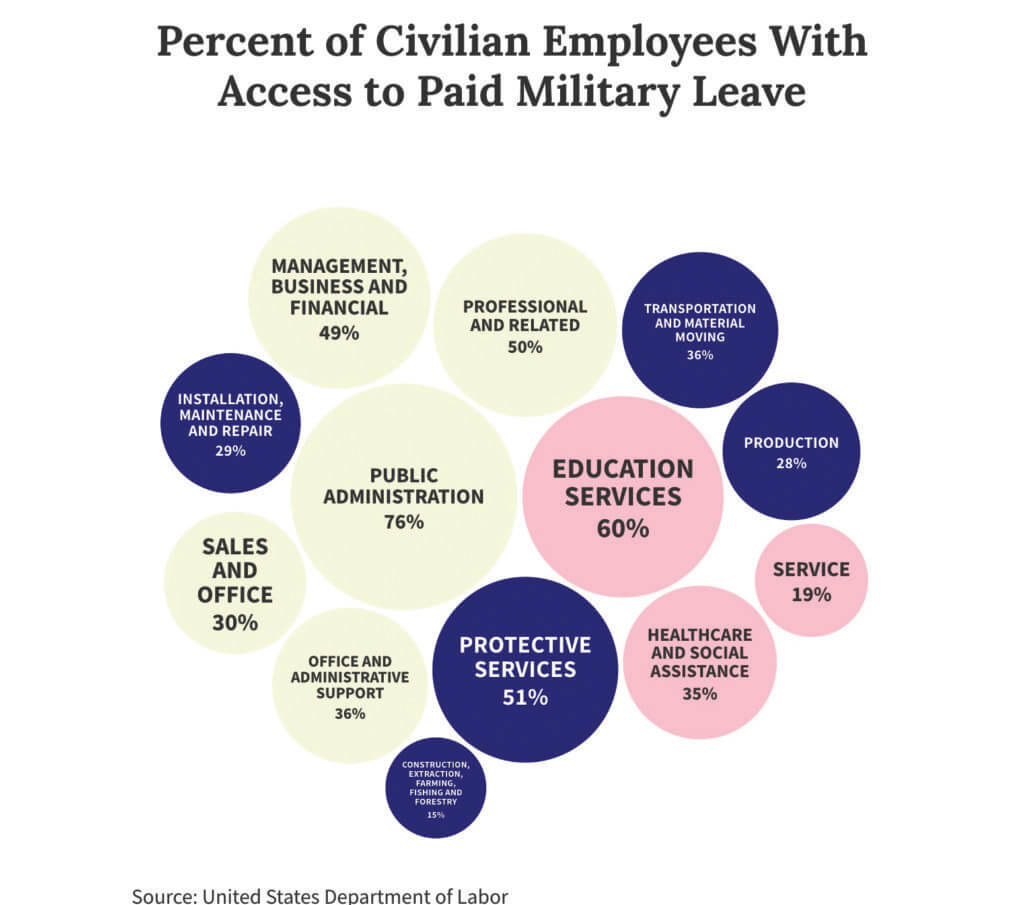Several guardsmen and reservists who missed work due to military activations have launched a new mission – convince a jury that their employment rights are being violated.
They argue that employers break the federal Uniformed Services Employment and Reemployment Rights Act of 1994 if they offer paid leave for jury duty, vacations, bereavement or sickness but not for military activations. Multiple lawsuits are moving forward following success in the appeals process.
The class-action lawsuits were filed in the past few years amid increased activations. The National Guard Bureau reported that guardsmen and airmen logged more than 10.9 million days in 2020 while serving their communities as they responded to COVID-19, wildfires, civil disturbances and hurricanes. They served more than four times as many days as they did in 2019.
Reserve + National Guard Magazine analyzed data from the Bureau of Labor Statistics and found that while private and civilian employers are providing more paid leave overall since 2011, access to paid military leave has decreased.
Federal law dictates that while public employers must pay such leave to guardsmen and reservist employees, civilian and private companies are not required to do so. The result is a significant disparity in access to paid military leave in blue collar vs. white collar career fields.
Lawsuits aim for ‘equal benefits’
A class action claim filed by Casey Clarkson, an active member of the Washington Air National Guard and an Alaska Airlines pilot, argues that he and other pilots working for Alaska Airlines and Horizon Air Industries Inc. lost seniority status and were denied regular wages while performing military service. The lawsuit claims the airlines violated USERRA because the companies paid full wages to non-military employees when they took comparable sick leave and jury leave.
The airlines responded that they are not required to pay employees who take military leave and don’t provide any rights or benefits to employees who take other types of leave that are not also provided to employees who take military leave.
In February, the federal 9th Circuit Court of Appeals moved to send the case to a jury trial.
Jonathan Taylor, Clarkson’s attorney and principal for Gupta Wessler PLLC, said the financial impact of paid military leave for employers would be “modest,” as a small portion of the workforce serves in the Guard and reserves.
“If (employers) offered one or two weeks of sick leave, there should just be the same thing for paid military leave,” Taylor said. “All we’re trying to say is that companies can’t disadvantage military leave. If you’ve decided as an employer that you’ll pay people for three weeks to have a pina colada poolside in Cancun, you can pay people three weeks to go perform military service in defense of our nation.”
Taylor and his clients are eager to present the case to a jury for judgment.
“In every case, the named plaintiffs are people who have lost compensation as a result,” Taylor said. “They’ve been financially harmed and want to be made whole – but that’s not their only interest in bringing these cases in. They believe deeply in this principle, and they’re fighting for that.”
What the military leave data reveals
In an examination of BLS data, Reserve + National Guard Magazine discovered some occupations are more likely than others to offer paid military leave to their employees.
In the private sector, only 5% of employees working in leisure and hospitality have access to paid military leave, compared to 64% of employees who work in the credit information field.
In the civilian sector, 75% of guardsmen and reservists who work in public administration have access to paid military leave. In comparison, only 15% of those who work in construction, farming, fishing and forestry are offered the benefit.
While access to paid military leave has remained relatively steady for private sector jobs in finance and transportation, it’s significantly declined for careers in utilities, such as electrical power companies, natural gas distribution, water, sewage and other systems.
Paid military leave remains common for civilian employees working for hospitals and universities but has significantly decreased for employees working in sales, goods production and natural resources.
Clarkson’s legal team must prove that military leave is comparable to time away for jury duty, sickness or vacation to succeed in court. Only time will tell if the legal battle will inspire some employers to re-evaluate their paid leave policies.
“Some fairly large employers already provide somewhat generous military leave policies,” Taylor said. “Some of them are the result of litigation, and others just out of the goodness of their heart recognize the contributions that military employees make and try to provide an incentive for them to work there. It’s a pretty modest ask, and it is not just legally required but a moral imperative that connects to our national defense.”

